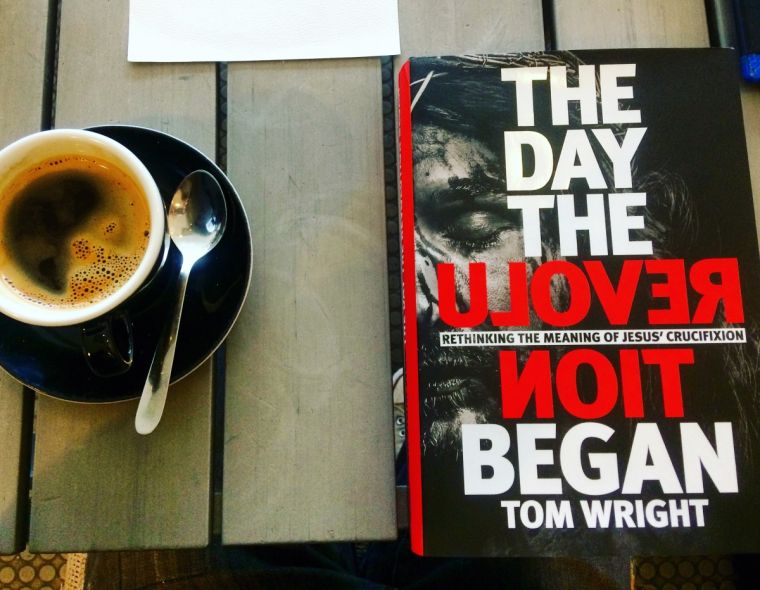Revolution Reviewed: Why You Should Read Tom Wright's Latest Book

The Cross is bigger than you think.
That's the contention of Tom Wright in his latest book, The Day the Revolution Began (SPCK, £19.99). Wright's book is vast in scale, and deep in insight. It is controversial in some places, but for good reason. Wright has important things to say, and this book is a must read not just for preachers and teachers, but for anyone interested in what the Cross is all about.
What happened on Good Friday? Why does it matter? That is the question Wright probes in his book. It is not a new question, in fact many Christians may feel over-familiar with it – but that is just the point. Wright feels that many have settled for a simplistic caricature of what the cross was about. It may not be deliberately preached in this way, but what many hear when they hear about 'the atonement' is something narrow, individualistic, and morally troubling. As he put it in this interview with Christian Today, the cross has to be more than: "I've been very bad, God was going to punish me but he punished Jesus instead so now its alright and I can go to heaven can't I... Instead of 'For God so loved the world that he gave his one and only son', you end up saying that 'God so hated the world that he killed his son'...why do people hear that?"
The book comes in four parts: first Wright traces the puzzle of the cross through history, following its development from a brutal symbol of political oppression to a radical symbol of Christian hope, and on to the complex and varied meanings it can have today. Misunderstanding the Cross, says Wright, often takes this shape: "In most popular Christianity, 'heaven' (and "fellowship with God" in the present) is the goal, and 'sin' (bad behaviour, deserving punishment) is the problem. A platonised goal and a moralising solution – and together they lead...to a paganized 'solution' in which an angry divinity is pacified by human sacrifice."
Wright challenges this by returning to Scripture to ask what it could have meant for the New Testament to say that "Christ died for our sins in accordance with the Bible." He highlights the Jewish hope: rooted in a call from God to reflect his image and to bless all the nations, the Jewish people now longed for a new Exodus from their slavery to occupying powers, and a freedom from their exile, which would be marked by 'forgiveness of sins.' Israel's sin was not simply abstract wrongdoing, but was rooted in idolatry: worshipping – and thus giving power to – that which was not God, thus eroding their own humanity in the process.
In the New Testament, we see expectations of a Messiah, of suffering, of the return of the presence of God, and of the restoration of Israel come together in ways that no one expected. That is to say – in Jesus the Messiah, who claimed to be God becoming King on earth. Wright explores how Jesus understood his own death: giving his followers not a formula, but a meal – intentionally bringing his mission to a climax at Passover, when the Jews celebrated their liberation from oppressive powers and looked forward to a new Exodus. In his death Jesus was marking a new Exodus: a defeat of the powers and their grip on humanity, a victory won through God's radical self giving love.
Wright concludes with an enthusiastic challenge for the Church to be 'passover people', to live in light of the revolution that began on Good Friday. Not simply waiting for heaven, but recognising that the world is now a tangibly different place, and those who are "in the Messiah" are tangibly different people. Or at least we can be.

Wright's book is a gift. It is intellectually stimulating, and personally challenging. As Andrew Wilson remarked about reading Wright's previous epic Paul and the Faithfulness of God, the professor takes us on a journey, and you'll finish this book feeling taller. It is long, perhaps a little too long for a popular level book (a healthy 416 pages) – but it isn't unrewarding. On an issue this large and complex, I'm glad Wright took the time to address the issue from so many different angles, and in such depth.
On an issue that is well-worn, Wright brings genuinely fresh insight and thoughtful wisdom. It's easy for a book such as this to come across as excessively avant-garde, or too eagerly iconoclastic – but Wright's emphasis is not on reinventing the wheel, but on expanding people's vision to a Gospel that is bigger and more beautiful than they knew.
At times perhaps Wright is a little overstated. Some will be frustrated by his reference to caricatures of certain atonement theories – Wright is clear that these are caricatures – but it can come across a little uncharitable to those with whom he disagrees. His ultimate emphasis though, is not on assassinating any particular opponents, but on positively explaining the breadth and depth of his own view. Crucially, the caricature he combats is not a ghost: much evangelical preaching I have heard veers in its direction, leaving us with something strange, quite troubling, and devoid of the love of God.
If you want to know what the Cross of Jesus was about, you should read this book. It doesn't explain everything (one might worry if it tried to), and you might not agree with all of it, but if so you should at the very least think about why you disagree with it.
Read this book, and be challenged, encouraged, and inspired by the revolutionary nature of the Cross.
The Day the Revolution Began (SPCK, £19.99) by Tom Wright, is out now.











